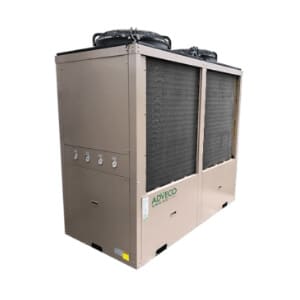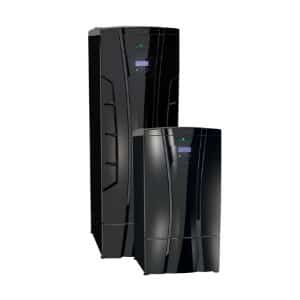Hybrid Heating – the validity of gas in future hot water applications
In part one we looked at why you might adopt a hybrid approach to commercial hot water and heating as a route to achieving Net Zero in commercial properties. In this second part, we consider the continued validity of employing existing gas technology…
There continues to be a call for a wide ban on the deployment of gas boilers in new properties, with a date of 2025 often mooted. Such a ban, though focussed currently only on domestic properties, would no doubt have repercussions for the commercial sector if/and when it comes to pass. But it is worth noting that ‘hydrogen-ready’ appliances would be exempt from any broad ban, so gas has a role to play in that mix of technologies driving us forward to Net Zero.
According to Mission Innovation (MI), an independent clean-tech research programme, half of the global emissions reductions required to achieve climate targets by 2050 depends on technology that still currently remain at a demonstration or prototype phase. Whilst development continues into the provision of new fuels such as green hydrogen – and we could be looking at at least a decade before this is universally available – there remain clear cases, especially in terms of reducing running costs, for retaining existing gas technology for commercial applications. We also recognise that the retention of existing infrastructure is critical for the cost-effective deployment of long term next-generation green technology, especially considering the large scale challenge of retrofitting existing properties.
Since 2015 the wholesale price of electricity has climbed 20%, yet gas prices over the same period are down on average 15%. The difference between the wholesale market price of electricity and its cost of production using natural gas provides us with the spark spread.
 At the time of writing, the spark spread is calculated to be 5.7. For a heat pump to break even against a 90% efficient gas boiler, the heat pump must demonstrate a COP of 5.15. The Adveco FPI32-6 can exceed this COP, but only at warmer ambient temperatures. Far more realistic is to use seasonal COP, which at 5.15 is beyond the capability of most current generation units. When assessing the efficiency of commercial air source heat pump (ASHP) technology, we calculate the ratio between the electricity invested in order to run the ASHP and its output, this is the COP. The COP can be influenced by a number of factors including the energy needs and energy efficiency of a property, quality of hot water and heating system installation, and once operational, the energy manager’s competency in maximising the system output. We would expect high performing commercial heat pumps to show a COP that range from 2.9 to a very high 4.7 due to variance in seasonal external temperature and heating flow temperature. The average ASHP system will typically exhibit a maximum COP much lower than the necessary 5.15. It is also worth considering that the latest generation of commercial gas boilers will exhibit even greater efficiencies, for example,
At the time of writing, the spark spread is calculated to be 5.7. For a heat pump to break even against a 90% efficient gas boiler, the heat pump must demonstrate a COP of 5.15. The Adveco FPI32-6 can exceed this COP, but only at warmer ambient temperatures. Far more realistic is to use seasonal COP, which at 5.15 is beyond the capability of most current generation units. When assessing the efficiency of commercial air source heat pump (ASHP) technology, we calculate the ratio between the electricity invested in order to run the ASHP and its output, this is the COP. The COP can be influenced by a number of factors including the energy needs and energy efficiency of a property, quality of hot water and heating system installation, and once operational, the energy manager’s competency in maximising the system output. We would expect high performing commercial heat pumps to show a COP that range from 2.9 to a very high 4.7 due to variance in seasonal external temperature and heating flow temperature. The average ASHP system will typically exhibit a maximum COP much lower than the necessary 5.15. It is also worth considering that the latest generation of commercial gas boilers will exhibit even greater efficiencies, for example,  Adveco’s MD boiler range can achieve a NET combustion efficiency of 106%. This means gas has a key role to play in ensuring a hybrid approach remains cost-effective.
Adveco’s MD boiler range can achieve a NET combustion efficiency of 106%. This means gas has a key role to play in ensuring a hybrid approach remains cost-effective.
As we progress forward, hydrogen-ready commercial gas appliances (boilers and water heaters) will leverage high efficiency, economic fuel blends with the additional advantage of considerably diminishing the carbon impact of commercial properties.
We see hydrogen playing a valuable role in meeting the needs for heating the UK’s commercial buildings but it will never be a 100% solution. This is why gas appliances in combination with heat pumps remain the best, and most cost-effective to deploy and operate method for commercial organisations to decarbonise operations and drive a low carbon economy.
Whether or not ongoing Government consultation decides to recognise the importance of ‘hybrids’ with financial support, the simple truth is that for the broad majority of commercial organisations looking to refurbish, capital investment and operational costs for heating and cooling systems are a critical decision factor. Hybrid systems offer the best option now and in the longer term as new green gas options come into play
The Hybrid Balancing Act
To truly reap the rewards of a hybrid heating system its energy management system needs to be implemented as part of the smart grid, with flexible electricity tariffs. When electricity volumes increase, prices fall. In a smart grid, when the corresponding price signal reaches the hybrid heating system it will be able to optimise the use of renewable electricity in terms of cost and availability.
In view of the extremely high volatility of renewable energy sources (RES) electricity, there will inevitably be peaks in supply above demand for electricity. In particular, this naturally occurs at high levels of wind and solar radiation. At present, an excess supply of RES electricity is either decommissioned at production peaks or sold. In extreme cases, as has been seen in the Netherlands, this could lead to negative electricity prices. To counteract this uneconomic development, it is necessary to introduce flexible electricity prices and pass them on to customers in order to stimulate production-dependent consumption. If there are high quantities of renewable energy in the grid, a heat pump will supply the building with heating and hot water. In cold phases, the heat pump covers only a part of the necessary heat output in the case of a hybrid system with the condensing gas boiler taking over to cover the remaining heat requirement and, if necessary, provides a higher system temperature.
This load management, the smart balancing of heat pump and condensing boiler operation, not only addresses the lifetime cost of operating a system it can help with the support of grid capacity (with fiscal remuneration if selling electricity generated), stabilisation of reserve capacities and potentially reduce the need for grid expansion.
The ability to provide greater efficiencies through smart metering and the use of flexible electricity tariffs to reduce operational costs for a lower total cost of ownership across the lifespan of the system is advantageous. The opportunity to impact load management across the grid however is a real game-changer for businesses being held up as a major guilty party when it comes to the continued generation of greenhouse gasses. Hybrid systems, therefore, offer a fast, cost-effective and realistic means to address ageing and environmentally unfriendly heating systems.
Discover more about renewable technology from Adveco
Call us on +44 (0) 1252 551540 or complete the contact us form.














